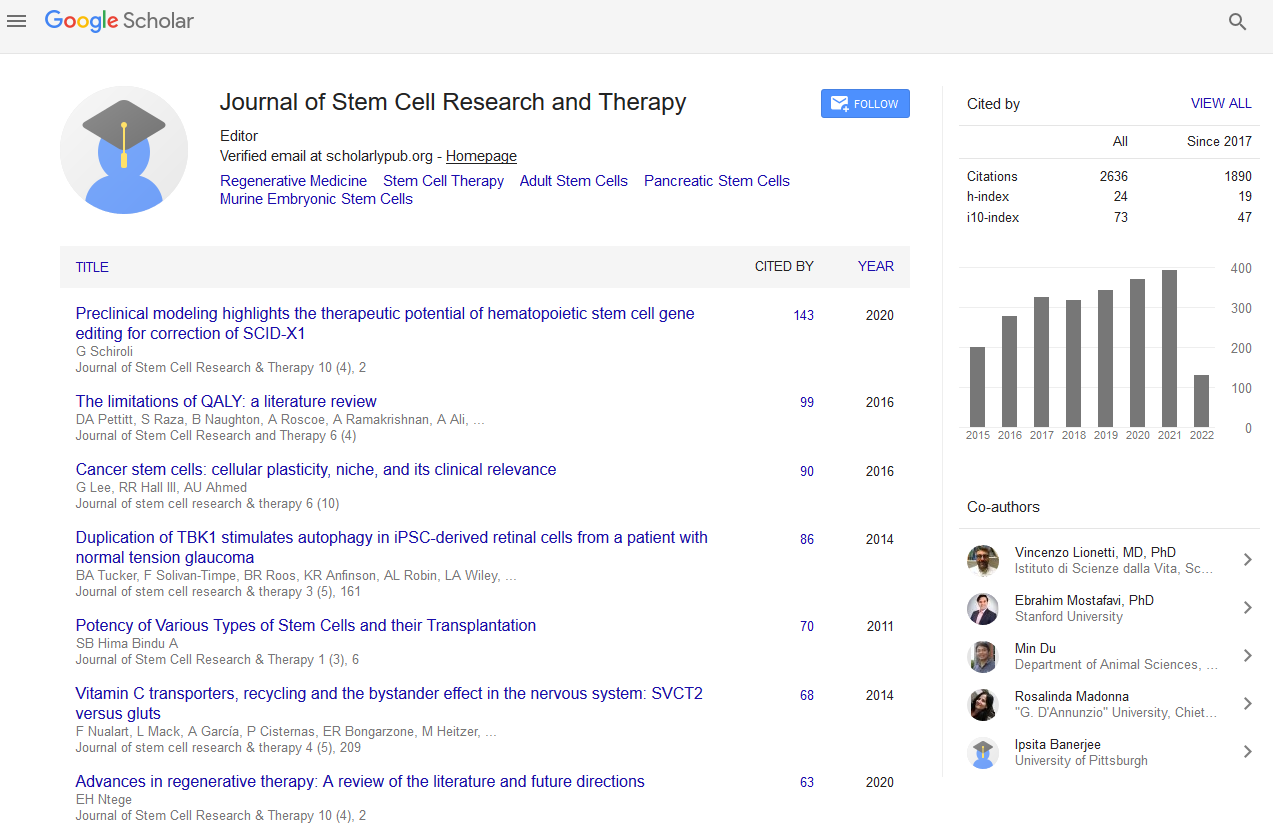Indexed In
- Open J Gate
- Genamics JournalSeek
- Academic Keys
- JournalTOCs
- China National Knowledge Infrastructure (CNKI)
- Ulrich's Periodicals Directory
- RefSeek
- Hamdard University
- EBSCO A-Z
- Directory of Abstract Indexing for Journals
- OCLC- WorldCat
- Publons
- Geneva Foundation for Medical Education and Research
- Euro Pub
- Google Scholar
Useful Links
Share This Page
Journal Flyer

Open Access Journals
- Agri and Aquaculture
- Biochemistry
- Bioinformatics & Systems Biology
- Business & Management
- Chemistry
- Clinical Sciences
- Engineering
- Food & Nutrition
- General Science
- Genetics & Molecular Biology
- Immunology & Microbiology
- Medical Sciences
- Neuroscience & Psychology
- Nursing & Health Care
- Pharmaceutical Sciences
The anti-apoptotic and pro-angiogenic properties of endogenous thyroid hormone and its action on P-glycoprotein may blunt response to conventional chemotherapy
3rd International Conference and Exhibition on Cell & Gene Therapy
October 27-29, 2014 Embassy Suites Las Vegas, USA
Paul J Davis
Keynote: J Stem Cell Res Ther
Abstract:
Integrin αvβ3 contains a plasma membrane receptor for thyroid hormone (L-thyroxine, T4; 3,5,3?-triiodo-L-thyronine, T3) that mediates the complex pro-angiogenic properties of the hormone. The integrin is expressed primarily by tumor cells and dividing endothelial cells. Molecular mechanisms of hormone-dependent angiogenesis involve multiple vascular growth factors, their receptors and growth factor release and are independent of classical nuclear receptor (TR) proteins. Thyroid hormone is also anti-apoptotic in tumor cells by a number of mechanisms, including inhibition of Ser-15 phosphorylation of p53 and cell accumulation of BcLx-s. The hormone supports export of conventional chemotherapeutic agents from cancer cells by increasing P-glycoprotein (MDR1, ABCB1) gene expression and activity of the protein. Studies of cancer cell gene expression with an inhibitor of T4 action at the integrin, tetraiodothyroacetic acid (tetrac) and its nanoparticulate formulation (Nanotetrac), infer that thyroid hormone supports transcription of cell survival genes and oncogenes. The DNA damage response (DDR) to radiation is also inhibited by Nanotetrac, implying support by T4 of DDR. In the setting of relapsed cancer, it is proposed that serum thyroid function tests be monitored and that biopsied tumor cells be cultured in a suitable model, e.g., the xenograft-receptive chick chorioallantoic membrane (CAM) system, and exposed to host serum and proposed therapeutic modalities to determine, respectively, endogenous host factor tumor support and chemotherapy or radiotherapy effectiveness in the presence of host serum, with and in the absence of added T4 and tetrac. We have shown the CAM system to be practical for this purpose in studies of radiotherapy effectiveness. Thyroid hormone inside the nonmalignant cell is essential to a spectrum of nongenomic metabolic and genomic protein synthesis functions. At integrin αvβ3 in cancer cells, however, T4 nongenomically initiates a panel of pro-angiogenic and tumor cell support effects; these effects culminate in clinically undesirable expression of cancer-relevant genes and of actions on protein trafficking and phosphorylation and blood vessel formation that support the cancer cell. Such actions are possible contributors to incomplete success of chemotherapy and radiotherapy in individual patients.
Biography :
Paul J Davis is Professor of Medicine at Albany Medical College and Professor of Pharmacy at the Albany College of Pharmacy and Health Sciences. He is former Chair of the Department of Medicine at the Medical College. He obtained his medical training at Harvard Medical School, Albert Einstein College of Medicine and the NIH. He is a Past President of the American Thyroid Association, a former Director of the American Board of Internal Medicine and is a Master and former Governor of the American College of Physicians. He is Head, U.S. Endocrinology and Metabolism panel of the Faculty of 1000 Medicine. He has co-authored more than 200 scientific publications, 25 textbook chapters and multiple editorials. He is Associate Editor at Endocrine Research (Informa) and on the Editorial Boards of Hormones and Cancer (Springer Publishing) and of Imunnology, Endocrine and Metabolic Agents in Medicinal Chemistry (Bentham). His research group was the first to identify a receptor or target for thyroid hormone on the outside of cancer cells that allows the hormone to be a growth factor for certain cancers and for the blood supply of malignancies. He has also been involved in the development of drugs to salvage nerve cells at the time of stroke and heart cells in the setting of reduced coronary artery blood flow..


